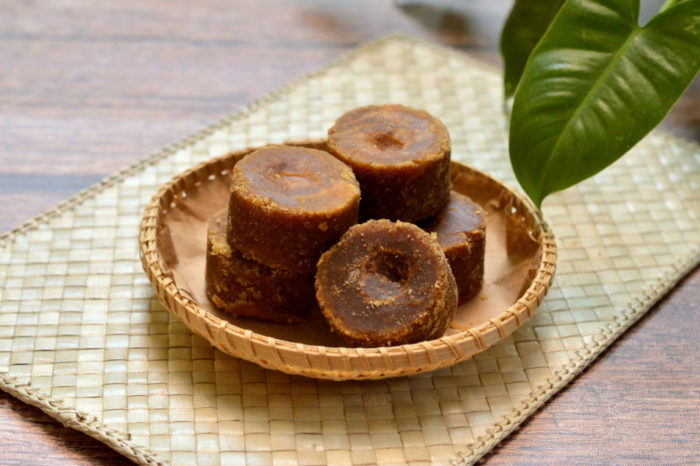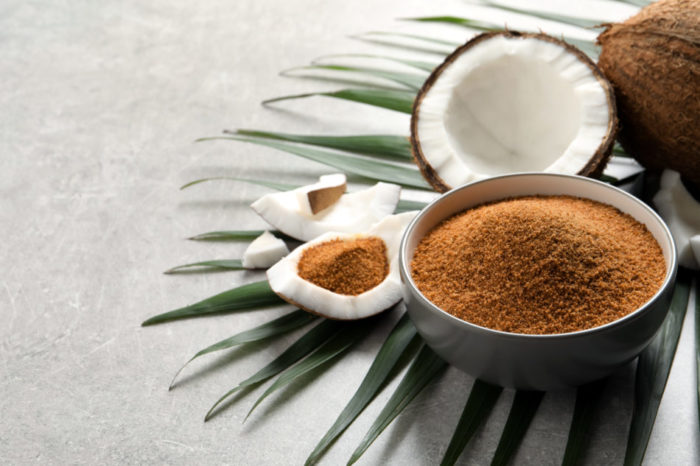Coconut sugar and palm sugar are increasingly popular sweeteners. They bring sweetness to the food but aren’t as intense as conventional refined white sugars. However, choosing between palm sugar vs coconut sugar can be a challenge unto itself.
One of the reasons for getting this sugar is that they’re both often labeled as palm sugar, even though they come from different trees. Palm sugar comes from the date palm tree (also called sugar palm tree) while coconut sugar comes from the coconut palm tree (or simply coconut tree).
The similarity of the tree species is one reason for this confusing labeling. But, there’s more to these sugars than just the trees. Let’s get to the nitty gritty!
Taste, Nutrients, And Glycemic Index Of Palm Sugar And Coconut Sugar
Coconut sugar and palm sugar are rather similar in taste, though they aren’t as sweet as conventional refined sugar. When using either of these sugars in place of refined sugar, you’ll have to add more to get the same amount of sweetness.
Palm sugar and coconut sugar have very similar tastes, though with a slight difference. Both sugars have wonderful caramel taste, something like butterscotch caramel and very similar to natural molasses. It’s an enjoyable taste and very desirable. Palm sugar has an added touch of a smoky flavor, which differentiates it from the taste of coconut sugar.
Coconut sugar includes a fair bit of nutrients, including calcium, iron, potassium, and zinc. It has better nutritional value than refined sugar and palm sugar.
It is claimed that coconut sugar has a low Glycemic Index (GI), though it is somewhat a matter of dispute. Some people claim that coconut sugar contains the fiber inulin, which slows the absorption of sugar in the body. Eventually, this contributes to the sugar having a GI around 35. Competing claims put the Glycemic Index of coconut sugar between 50-54, which is the same as conventional refined sugar. Palm sugar has a similar glycemic index.
The presence of nutrients often works in the favor of coconut sugar, helping to paint it as a healthier choice. In this sense, it might be a good competition for honey.
Palm Sugar vs Coconut Sugar: Differences And More
What Is Palm Sugar?

Palm sugar and coconut sugar are quite commonly used in South-East Asia and have a fair representation in South Asia/India as well. These are both natural sweeteners with a difference in how they are obtained and processed.
As already noted, palm sugar comes from the date palm tree and coconut sugar comes from the coconut tree. To be clear, palm sugar can come from a variety of palm trees, including coconut palm, but the coconut sugar is limited to the flower of the coconut palm tree.
To get palm sugar, the sap is collected from the trunk of the tree. In a way, this is quite similar to how maple syrup is extracted in North America.
The extracted syrup is then boiled in large vats to create a sugar paste or small chunks of sugar called “jaggery”. Interestingly, jaggery can also be made from cane sugar and is rather popular in India.
What Is Coconut Sugar?

Coconut sugar, on the other hand, comes from the buds or flowers of the coconut tree. A cut is made near the base of the flower, from which the sap is continuously collected. So, the origin of this sugar is inherently different from that of palm sugar. Moreover, coconut sugar must come only from the flowers and buds of the coconut tree.
On the other hand, palm sugar can come from several varieties of the palm tree. It generally comes from the sugar palm or date palm, the varieties may be used as well, depending on the region.
Once the nectar from the coconut flowers is collected, it is boiled in large vats to form a paste. As with palm sugar and cane sugar, coconut sugar or nectar can be turned into jaggery as well.
FAQ For Palm Sugar And Coconut Sugar
Does Coconut Sugar Taste Like Coconut?
Despite its origin and name, coconut sugar tastes nothing like coconut. The sugar (nectar or sap) is extracted way earlier than the formation of the fruit (coconut) and doesn’t take a flavor similar to the coconut. Instead, you can expect the coconut sugar to have a caramel taste with a lovely sweetness.
Coconut sugar doesn’t have the same sharp and sickly sweetness as refined sugar – a quality that helps set it apart from conventional sugar.
Are There Different Varieties Or Types Of Coconut Sugar?
Coconut sugar doesn’t have different types or varieties per se, but it is available in different forms. However, the size of the grain is naturally variable, so it may be sold in different grain sizes.
Sometimes, the process of forming the sugar is stopped before granulation, in which case, a coconut sugar paste. Some changes to the manufacturing are sometimes employed to create jaggery.
Is Coconut Palm Sugar Healthy?
There are several nutrients present in coconut sugar (or coconut palm sugar). These include calcium, iron, potassium, and zinc. As such, it has a better nutrient profile as compared to several other sugars, and can be somewhat comparable to honey.
Some people root their belief in the healthiness of coconut sugar through its (perceived) low Glycemic Index (GI). This is a dubious claim and it is very likely that coconut palm sugar has a GI very similar to conventional refined sugar.
Overall, while there are some nutrient benefits to the use of coconut palm sugar, it shouldn’t necessarily be seen as healthy. Use it moderately and exercise caution as you would with any other sweetener.
Is Palm Sugar Bad For The Environment?
Palm sugar might actually be a sustainable choice. Palm sugar gets a bad rep because of the perceived association with the palm oil industry, which has indulged in disastrous environmental practices. However, so far, palm sugar has proven to be different.
In a report by the Food and Agriculture Organization (FAO) for the world bank, it was reported that the traditional methods for manufacturing palm sugar are sustainable and likely better than other methods of sourcing sugar, including sugarcane farming.
The Bottom Line
If you’re choosing between palm sugar vs coconut sugar, you can rest assured that they are both excellent choices. Both sugars have great taste and their current production methods are sustainable. Coconut sugar also has some nutritional value, which is another factor to support its use.